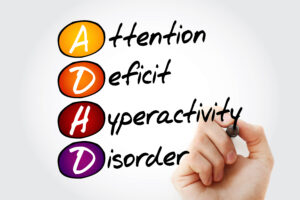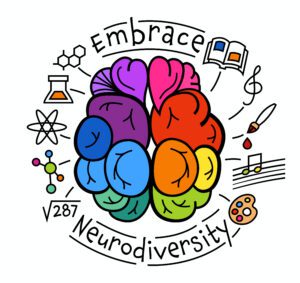12 Oct ADHD Awareness Part 1

You may hear about ADHD a lot in today’s world, but many people still do not understand it. What better way to explain and share the experience of what it is like to have ADHD than from the perspective of someone who has it? This is a young girl’s story of finding out she had ADHD, how her life is affected by it, and how she learns to manage it in order to thrive in her daily life:
Q: When did you realize or find out you had ADHD?
A: I think we always knew I had ADHD. I didn’t know what it was at the time, but I kind of always knew I had struggles focusing, a short attention span, was distracted very easily, I wouldn’t think before speaking, and was always hyperactive.
We found out I had ADHD in 7th grade. We went to go get me tested and it was so bad that I didn’t even get through the practice test. We started medication immediately and tried out different ones. I tried different things to manage it outside of medication, too. I made efforts to be more organized to keep myself on track with things and tried techniques I read about online.
Q: Did it all start to make sense when you learned about having ADHD?
A: Yes. It helps me to have an answer to know that it’s not my fault that I struggle with normal day things.
Q: What challenges do you face having ADHD?
A: Procrastination is a big one. I struggle to keep my mind alert, especially when I’m trying to do something that I have to do, but don’t want to. My mind trails off easily. I tend to hyperfocus on things, especially when I’m stressed. For example, if I get too close to my mirror, I’ll start picking at my skin and hyper focus on that. I hyperfocus on side projects that distract me when I have other things to get done. I have a hard time focusing on someone talking for a long period of time. I start to zone in and out. I have to constantly work on it to get better.
Getting up for school is always difficult. It starts with not wanting to get up. I think about how I don’t want to go into that stressful environment and deal with the responsibilities I have to do every day. When I do get up and get ready, I start thinking of things I want to do and get lost in my head, like I’m in my own little world and I lose track of time. I get in moments of hyperfixation when getting ready, like with my hair or makeup.

A lot of the time at school, I would get behind because I would get stressed over all the work. I would procrastinate doing assignments. During school, I would have better days than others. On the worst days, my mind would trail off when I am supposed to be doing work and I would begin to fidget a lot. On better days, I could focus and get things done. It certainly helps when I have a motivator or an end goal, like wanting to get into a good college. I would use that to motivate me to focus on my work and get good grades.
I often lose track of time to remember to do things like eat or get a chore done. I will tell myself, “I’m going to do this in 15 minutes,” and I will continue doing what I was doing before. Next thing I know, hours have passed and I haven’t gotten it done. I feel guilty for not being able to have self-discipline. Sometimes I beat myself up over it. When someone gets frustrated with me for letting things slip by, it doesn’t help with the way I already feel about myself. I suffer from depression, too, and the guilt from my ADHD fuels my depression and sends me deeper into my head, making it worse.
Q: Do you think trauma has any impact on your ADHD?
A: Yes. Trauma has impacted my depression and ADHD. I tend to want to avoid things, like conflicts or responsibilities. I feel safe in my head, which makes it easier to want to avoid doing things. All the mental illnesses I struggle with amplify my ADHD. They all play into one another.
Trauma affects my response to things, like when I get anxiety, it amplifies my ADHD. My mind races faster and if my anxiety is to a certain point, my brain will try to find an escape to feel safe. I often listen to music or read to comfort myself and escape from reality. Doing this makes it difficult to get things done very often. Along with my depression and other mental health struggles, ADHD played a part in my struggle with school. Eventually, I felt it was best for me to do school at home.
Q: How did you know changing to online schooling was right for you? Do you think it has positively helped you while dealing with ADHD and trauma?
A: It allows me to have more time to focus on getting myself better and working on my obstacles while learning to navigate through my daily life.
Q: What does a day in your life look like with ADHD?
A: It starts with struggling to get up in the morning. I have learned to set timers and alarms to help me keep track of time to get things done. I make lists of things to do. Even with that, it is a struggle to motivate myself to do those things. Motivation is a hard thing for me. A reward system is very helpful. I remember when I was a kid, my family used reward systems for me and it helped a lot. I struggle with getting started on school. I have to do a lot of self-talk. I also have to remind myself of the consequences if I don’t get it done.
If that doesn’t work, sometimes I have to just do it, which is easier said than done. I had to find things to help me focus on school and stay off my phone. I downloaded an app where I can set a schedule to block certain apps for a certain amount of time so I don’t have access to them and get distracted. I also had to learn certain techniques, like a timer for blocks of time when I have to do school and when I can take breaks. The breaks can’t be too long, because if they are, it makes it harder to get back into doing school.

When I have things to do, like chores, time often gets away from me before I get started on it. When I do finally start the chore, I get distracted with other things which makes the process take a lot longer. Sometimes listening to motivating music helps me stay out of my head and remain focused. I think about the fact that once I’m done, the weight will be lifted off my chest and I can do whatever I want. Throughout the day, even with medication, my daily routine consists of a lot of self talk, discipline, and encouragement.
Q: What are some words of wisdom or encouragement you could give to others who struggle with ADHD?
A: It’s not your weakness unless you let it be. You can turn it into a strength. You can use it to help yourself. You don’t have to suppress it, embrace it. Having ADHD does not make you any less normal or less smart than anyone else. It is part of what makes you unique. Don’t feel bad about yourself for struggling or having ADHD. No matter what anyone says about you due to their lack of understanding, remember your worth. Most importantly, know that you are not alone.


Sorry, the comment form is closed at this time.